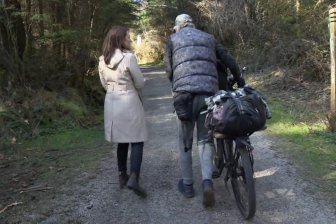OTTAWA – A shift in the campaign against the so-called Islamic State has resulted in Canadian soldiers spending more time on the front lines and engaging in more firefights with the enemy, a senior officer revealed Thursday.

Some of those battles included defending civilians as well as Kurdish allies, said Brig.-Gen. Peter Dawe, deputy commander of Canada’s special forces.
READ MORE: Canadian general says anti-ISIS fight about to grow harder
No Canadians were killed or injured in the “sporadic” skirmishes, he said, adding: “In all cases, self-defence is what is being exercised.”
Dawe’s comments came during a briefing at National Defence Headquarters on Canada’s mission against ISIS, which enters its third year on Friday. The briefing coincided with Iraqi forces preparing to launch a major operation to take back the city of Mosul, the last urban centre held by ISIS in Iraq.
The liberation of Mosul is expected to eliminate ISIS as a serious threat in Iraq. But there are also fears that it will unleash a number of internal conflicts between Iraq’s various ethnic and religious groups, which to this point have been loosely united in their fight against the extremist group.
While the Liberal government withdrew Canada’s fighter jets from Iraq and Syria earlier this year, about 170 special forces troops are continuing to work with Kurdish forces in the north of the country.
Their mission has been billed as “non-combat,” though the government says they can shoot in self-defence. Some critics have accused the Liberals of tailoring the definition of combat to fit with promises made during last year’s election campaign.
READ MORE: Canadian-trained Kurdish forces won’t clear ISIS from Mosul
Dawe said Canada’s mission has “evolved” since the spring, as Iraqi and Kurdish forces have shifted from defending against ISIS attacks to liberating territory occupied by the extremist group. As a result, he said, there has been more demand for advice and assistance. That includes helping the Kurds call in airstrikes.
Earlier in the mission, military commanders revealed the number of airstrikes Canadian troops had called in as well as the number of times they had engaged in firefights with ISIS forces. Dawe, however, would not provide such details on Thursday, citing operational security.
“The key takeaway for Canadians is we are more engaged at the line,” he said. “There should be no doubt about that. And by extension, the risk has increased to our troops simply by virtue of time spent at the line and the work we’re doing right now in a more dynamic and fluid environment.”
Added Lt.-Gen. Stephen Bowes, commander of all Canadian military operations at home and abroad, who was also at the briefing: “It’s the Iraqis that are in combat. Let’s be clear on that.”
READ MORE: ISIS prisoner kept as sex slave describes her dangerous struggle for freedom

Canadian troops have trained about 2,000 Kurdish fighters over the past two years. Many of them are now moving into position around Mosul in preparation for the assault to retake the city, which is home to 1 million people. But exactly how that battle will play out, and what will come after, is far from clear.
International leaders have previously warned about the need to control which groups are involved in clearing Mosul. The focus has largely been on the Shia militia groups, which are accused of indiscriminately killing Sunni Muslims in areas freed from ISIS’s grip. The groups say those killed were ISIS sympathizers.
READ MORE: Turkey in cross-border operation to free Islamic State-held Syrian town
But the Kurds, who have a semi-autonomous government in northern Iraq, have made no secret of their hopes for full independence after ISIS is defeated. They have also clashed several times with the Shia groups, and warned they will not return territory liberated by the peshmerga but claimed by Baghdad.
The fear is that while the liberation of Mosul will mark the end of ISIS as a major threat in Iraq, it will mark the beginning of a new round of violence as the various ethnic and religious groups that have been fighting ISIS stake claim to territory and power.
Bowes acknowledged the “tremendous complexity” on the ground in northern Iraq, as well as the uncertainty of what will come after Mosul.
“The ground is fluid and it is extremely complex, even for people that are devoting attention to this day in and day out,” he said.
“There’s a history that is complicated going back hundreds of years. And for anybody to sit here and say ‘This is how it’s going to unfold, this is how Mosul is going to be liberated,’ I’m not going to go there.”



Comments